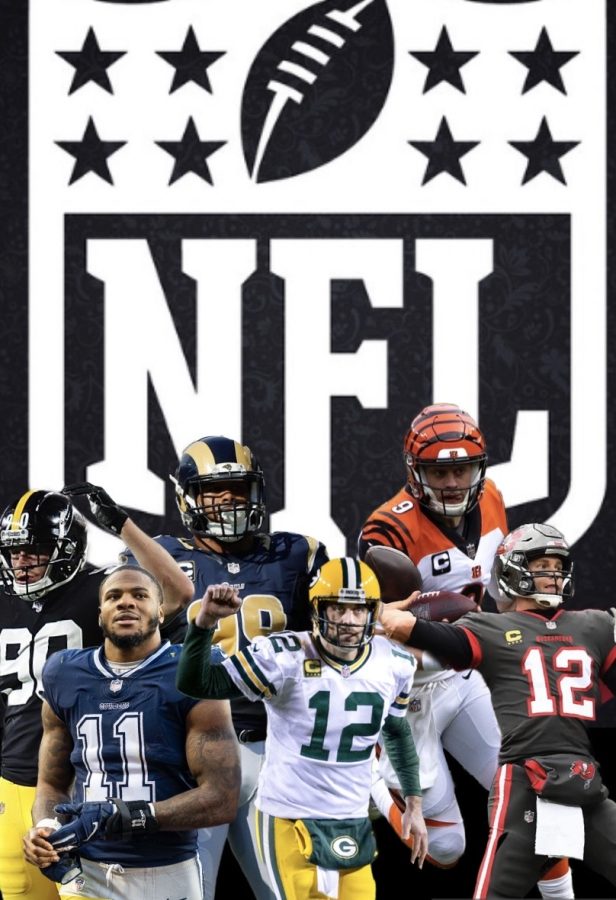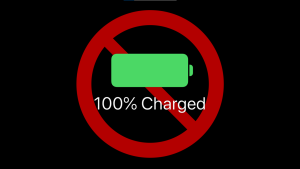The Falcon Flash Sports Team Predicts the Winners of the Major 2021 NFL Awards
Flickr.com & Wikimedia Commons
The three major candidates for the Defensive Player of the Year award (left) and Most Valuable Player (right).
January 21, 2022
Ethan’s Picks
Most Valuable Player (MVP): Tom Brady, QB Tampa Bay Buccaneers
With yet another dominant season, Brady continued to prove the doubters wrong, as he has seemingly failed to age. Brady’s 2022 season was one of his best (statistically) of his career, throwing for 5,316 yards (ESPN.com), the most he has thrown for in a season in his entire career. Just shy of his career high of 50, Brady’s 43 touchdowns lead the league(Pro-Football-Reference.com). Brady also managed to lead the league in passing yards, pass yards per game, and pass completions per game. Packers QB Aaron Rodgers also has a strong candidacy for MVP, but one can simply not deny that Brady’s historical, league-leading season is the worthiest for the prestigious MVP.
Defensive Player of the Year (DPOY): T.J. Watt, OLB Pittsburgh Steelers
Tying the NFL sack record in just 15 games (less if you consider the amount of games that he left early in) easily proves why Watt should be the Defensive Player of the Year. Not only did Watt record 22.5 sacks (23.5 if you count his sack in the playoffs), but he forced five fumbles, recorded 21 tackles for loss, and defended seven passes (Pro-Football-Reference.com), which is amazing for an edge rusher, especially considering that Watt was double-teamed more and dropped back into coverage less this season. While hard to statistically measure or prove, Watt’s clutchness is another reason why he is the obvious DPOY. In overtime, with the game on the line, Watt forced a fumble on Seahawks QB Geno Smith to set up a Chris Boswell game-winning field goal. Later in the season, Watt pressured Ravens QB Lamar Jackson, forcing a poor pass on a potential game-winning two-point conversion. Others in this conversation could obviously make these plays, but the timing of the plays, when his team is counting on him to save a victory, is what makes Watt stand out.
Offensive Player of the Year (OPOY): Jonathan Taylor, RB Indianapolis Colts
In his sophomore campaign, Taylor rushed for a whopping 1,811 yards and scored 20 total touchdowns (Pro-Football-Reference.com). After leading the league in almost all major rushing categories, one could argue that Taylor is the best running back in the league, at least with Tennessee’s Derrick Henry injured. With QB Carson Wentz’s struggles, Taylor was able to carry a massive workload and demonstrate his monstrous talent, being the deciding factor in a multitude of games. While Cooper Kupp has great reason to win this award as well, one can see that Kupp benefits from being on a team with multiple other great receivers, making defenses unable to focus solely on Kupp. Taylor, on the other hand, gets large amounts of attention from the opposition, but still was able to produce mind-blowing statistics as a second-year running back.
Comeback Player of the Year (CPOY): Joe Burrow, QB Cincinnati Bengals
After suffering from one of the worst injuries in sports, “Joey Franchise” bounced back by leading the Bengals to their first playoff win since 1991. A torn ACL and MCL could not stop the sophomore sensation from throwing for 4,611 yards and 34 touchdowns (Pro-Football-Reference.com). Burrow’s season was so impressive that his name began getting consideration for the MVP. Although Dallas’s Dak Prescott also had a very good season after coming back from a gruesome leg injury of his own, Burrow deserves this award for his efforts in transforming a struggling Cincinnati team into a Super Bowl contender.
Offensive Rookie of the Year (OROY): Ja’Marr Chase, WR Cincinnati Bengals
With the fifth overall pick in the 2021 NFL Draft, the Cincinnati Bengals decided to take Chase, who opted out of the 2020 NCAA season, over the Heisman-winning Devonta Smith. Well, let’s just say that Cincinnati made the correct choice. Dominating with former LSU teammate Joe Burrow, Chase recorded 81 receptions for 1,445 yards and 13 touchdowns. Five of Chase’s touchdowns were from 50 or more yards out from the endzone, which is absolutely astonishing. With elite speed, great footwork, and surefire hands, the former Tiger has cemented himself as a top ten receiver in the NFL, despite playing only one campaign. Patriots QB Mac Jones could also be considered for this award, but with the high level that Chase has performed at, it seems wrong to not give this one to the Cincinnati Bengals.
Defensive Rookie of the Year (DROY): Micah Parsons, LB Dallas Cowboys
Any player that finds themselves in the DPOY conversation as a rookie must be a special talent. The same is true for Parsons. Similar to Chase, Parsons decided to opt out of the 2020 NCAA season due to COVID-19, but his draft stock did not take a hit. Instead, the Dallas Cowboys decided to select the intriguing prospect at twelfth overall. Parsons’ impact was immediately felt, recording 7 tackles, a quarterback hit, and a defended pass against Tom Brady and the Buccaneers on Thursday Night Football. On the year, Parsons finished with 13 sacks (sixth in the league), 84 tackles, and 17 QB knockdowns (TeamRankings.com). Parsons is a special talent, and no other defensive rookies come close to him on winning this award.
Peter’s Picks
Most Valuable Player (MVP): Aaron Rodgers, QB Green Bay Packers
This season has been one of the most competitive MVP races in recent history, with what feels like nearly half of the teams in the NFL staking a claim to a candidate at some point in the season. At this point, however, Aaron Rodgers has put together a sensational case to repeat while leading the Packers to the top seed in the NFC, and only Tom Brady has a semi-good case to stand in his way. Rodgers was top 10 in every standard passing statistic in the NFL: yards, touchdowns, completion percentage, etcetera (Pro-Football-Focus.com). He did this on exceptionally limited volume, as the Packers ran the ball a lot late in games after Rodgers had put them ahead. Where Rodgers really shines over Brady, however, is in the advanced statistics. Rodgers is first in the league in touchdown percentage (percent of passes that end in touchdowns), and has the lowest interception percentage (percent of passes that end in interception, and quarterback rating (111.9). Comparatively, Brady is 8th in touchdown percentage, 6th in interception percentage, and 7th in quarterback rating (102.1). Brady also leads the league in interceptions with 12, and has thrown the most passes in the NFL by far. Overall, Rodgers has been much better on a better team than Tom Brady with less volume, and that should be enough to win him another MVP award.
Defensive Player of the Year (DPOY): T.J. Watt, OLB Pittsburgh Steelers
T.J. Watt has had one of the best defensive seasons in recent memory, as he’s almost single-handedly dragged the Steelers into the playoffs this past season. The stats (mentioned above) are sensational, but what is even more impressive is the context under which he is putting them up. Watt’s sacks aren’t coming in easy, garbage time situations where backup offensive lineman are playing. They’re coming in the end of tight games, while being double and sometimes triple-teamed. Watt’s stats don’t even tell the whole story, as the attention he creates lets his teammates rack up sacks and pressures of their own. Even more impressively, the mere presence and thought of Watt being there has forced many errant throws by many quarterbacks. After finishing in the top three in voting for the past two years, this year is TJ Watt’s year to finally win DPOY.
Offensive Player of the Year (OPOY): Cooper Kupp, WR Los Angeles Rams
Kupp has spent the last couple of years being viewed as good. He was the type of guy that was looked at as being in the upper echelon of guys, but not quite in the same tier as people like Davante Adams and Stefon Diggs. Well, at least statistically, Kupp has been above all of those guys this year. In his first year with new QB Matthew Stafford, he totaled 145 receptions for 1,947 yards and 16 touchdowns (Pro-Football-Reference.com), getting second in both the receptions record and the receiving yards record. The argument for Kupp over Jonathan Taylor is simple: you can stop or manage Jonathan Taylor, as the Seahawks, Jaguars, and Titans proved. Jonathan Taylor averaged 68.3 yards over those three games on decent volume (Pro-Football-Reference.com), and he was running behind a great offensive line featuring Quenton Nelson and Ryan Kelly. Kupp, on the other hand, has had to deal with Matthew Stafford’s inconsistency at times, as well as getting targets both siphoned from him at times and having defenses key in on him, depending on the health of his fellow receivers. Kupp’s consistency in a year where that was tough to find should be enough to give him the OPOY award.
Comeback Player of the Year (CPOY): Joe Burrow, QB Cincinnati Bengals
There were many questions about Joe Burrow entering this year, relating to his consistency, injury history, and NFL readiness after only having one college season of top tier production and tearing his ACL and MCL this past season. Well, these questions are now safely answered after completing one of the best seasons in Bengals history. Burrow’s stats are top tier, but the intangibles are what put him a step above the rest. His great play in the clutch, swagger, and calm under pressure are unmatched, and his improvisational skills and quick processing are top notch as well. Most importantly, Burrow has brought the Bengals from consecutive top 5 picks to their first playoff win in 31 years, and a chance for more.
Offensive Rookie of the Year (OROY): Ja’Marr Chase, WR Cincinnati Bengals
Even in a class of incredible rookie wideouts such as Devonta Smith and Jaylen Waddle, Chase has taken the NFL by storm this season. Chase, as well as his former teammate Joe Burrow (mentioned above) have been a revelation on one of the most surprising teams of the year, the Cincinnati Bengals, who recently won their first playoff game in 31 years. The rookie wideout was able to hook up with his college teammate for a record-breaking 1,455 yards and 13 touchdowns (Pro-Football-Reference.com). Although Mac Jones has done well with the New England Patriots this season, it is impossible to give this award to anyone other than the player who already may be a top-eight receiver in the league.
Defensive Rookie of the Year (DROY): Micah Parsons, LB Dallas Cowboys
The Dallas Cowboys got a steal in last year’s first round of the Draft, selecting Micah Parsons at 12 after a trade down. Parsons has taken the league by storm this season, helping to transform a formerly pushover Cowboys defense into one that ranks first in the NFL in takeaways (Pro-Football-Focus.com), and has helped to carry the team at points throughout the season. His impact can be felt all over the field, as he has been moved all around the field, from a traditional off-ball linebacker spot to an edge rusher. Parsons has the DROTY award all locked up, and should be a special player for the Cowboys for years to come.






